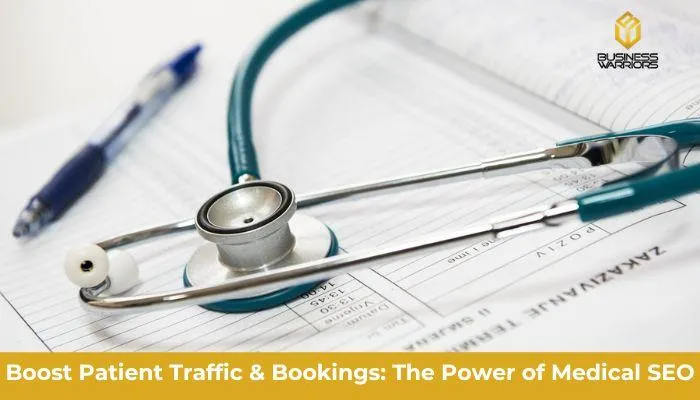Blog

Boost Patient Traffic & Bookings: The Power of Medical SEO
In today's digital age, having an online presence is crucial for medical practices looking to attract new patients and grow their business. With more and more people turning to the internet to search for healthcare providers, implementing an effective medical SEO (Search Engine Optimisation) strategy has become essential. In this comprehensive guide, we'll explore the power of medical SEO and how it can boost patient traffic and bookings for your practice.
Understanding the Importance of Medical SEO
Search engines like Google play a pivotal role in connecting patients with healthcare providers. When people search for medical services or information related to their health concerns, they rely on search engines to provide them with the most relevant and trustworthy results. By optimising your website and online presence for search engines, you can increase your visibility and make it easier for potential patients to find you.
Medical SEO is not just about ranking high on search engines; it's also about providing a seamless user experience and building trust with your target audience. A well-executed medical SEO strategy can help you:
Improve Online Visibility
By optimising your website and online listings for relevant keywords and phrases related to your medical practice, you can improve your visibility in search engine results pages (SERPs). This increased visibility can lead to more website traffic and potential patient inquiries.
Enhance User Experience
An optimised website that loads quickly, is mobile-friendly, and provides valuable and engaging content can significantly improve the user experience for potential patients. A positive user experience can lead to higher engagement, increased trust, and ultimately, more bookings.
Build Trust and Credibility
Medical SEO also involves creating high-quality, informative content that addresses your patients' concerns and questions. By providing valuable information and establishing yourself as a trusted authority in your field, you can build credibility and trust with your target audience, making them more likely to choose your practice over competitors.
Key Elements of a Successful Medical SEO Strategy
To effectively implement a medical SEO strategy and reap its benefits, there are several key elements you should focus on:
Keyword Research and Optimisation
Identifying and targeting the right keywords and phrases related to your medical practice is crucial for medical SEO success. Conduct thorough keyword research to understand what your potential patients are searching for and optimise your website content, meta tags, and other on-page elements accordingly.
Local SEO Optimisation
For medical practices that serve a specific geographic area, local SEO optimisation is essential. This includes optimising your Google My Business listing, obtaining citations and listings on reputable online directories, and incorporating location-based keywords into your website content and meta tags.
Technical SEO
Technical SEO involves optimising the technical aspects of your website to ensure it is search engine-friendly. This includes factors like site speed, mobile responsiveness, SSL certification, structured data markup, and more. Neglecting technical SEO can negatively impact your search engine rankings and user experience.
Content Marketing
Creating high-quality, informative, and engaging content is a cornerstone of effective medical SEO. This can include blog posts, patient education resources, infographics, videos, and more. By providing valuable content that addresses your patients' concerns and questions, you can establish yourself as a trusted authority in your field and improve your search engine rankings.
Link Building
Link building is the process of acquiring high-quality backlinks from reputable and relevant websites. Search engines view backlinks as a vote of confidence and a signal of your website's authority and credibility. A strategic link building campaign can help improve your search engine rankings and drive more referral traffic to your website.
Measuring the Success of Your Medical SEO Efforts
To ensure your medical SEO strategy is effective and delivering the desired results, it's essential to track and measure key performance indicators (KPIs). Here are some important metrics to monitor:
Organic Traffic and Rankings
Track your website's organic traffic and search engine rankings for your target keywords and phrases. Increases in organic traffic and higher rankings can indicate that your medical SEO efforts are paying off.
Conversion Rates
Monitor the conversion rates of your website visitors, such as form submissions, appointment bookings, or phone calls. A successful medical SEO strategy should not only drive more traffic but also increase conversions and patient acquisitions.
Patient Acquisition Cost
By comparing the cost of your medical SEO efforts to the number of new patients acquired, you can calculate your patient acquisition cost (PAC). A lower PAC can indicate a more efficient and cost-effective marketing strategy.
Patient Engagement and Satisfaction
Engage with your patients and gather feedback on their experience with your practice. High patient satisfaction and positive reviews can not only improve your online reputation but also contribute to better search engine rankings.
Leveraging the Power of Medical SEO
Implementing an effective medical SEO strategy can be a game-changer for healthcare practices looking to boost patient traffic and bookings. By optimising your online presence, providing valuable content, and building trust and credibility, you can increase your visibility, attract more potential patients, and grow your practice.
However, medical SEO is not a one-time effort; it requires ongoing optimisation, monitoring, and adaptation to changing search engine algorithms and industry trends. By consistently monitoring your performance and making data-driven adjustments, you can ensure that your medical SEO strategy remains effective and delivers long-term results.
In conclusion, the power of medical SEO lies in its ability to connect you with the right patients at the right time, when they are actively seeking healthcare services. By investing in a comprehensive and well-executed medical SEO strategy, you can establish a strong online presence, build trust and credibility, and ultimately, drive more patient traffic and bookings for your practice.
WHAT WOULD YOUR RETURN ON INVESTMENT LOOK LIKE USING OUR DIGITAL MARKETING VORTEX METHOD TO YOUR BUSINESS?
GET THE DIGITAL MARKETING AGENCY SECRETS: 7 STEPS TO DOUBLE YOUR WEBSITE TRAFFIC IN 90 DAYS OR LESS








